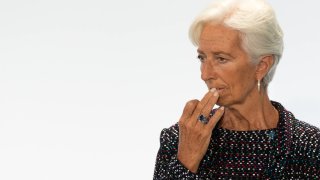
- Headline inflation figures released in January showed inflation at 0.9% year-on-year, the highest level in almost 12 months.
- In addition, core inflation, which removes volatile items such as energy and food prices, reached 1.4% year-on-year in January from 0.2% in December.
- After its latest policy meeting, last week, the central bank said that its bond purchases will increase "significantly" in the next quarter.
LONDON — European Central Bank President Christine Lagarde said the bank will not respond to inflation "blips" on Thursday, as prices rise in the euro area.
The ECB has struggled to achieve its inflation target of close to, but below, 2% over the past few years, which has been exacerbated by the coronavirus pandemic. However, recent data has shown an uptick in prices.
Headline inflation figures released in January showed inflation at 0.9% year-on-year, the highest level in almost 12 months. In addition, core inflation, which removes volatile items such as energy and food prices, reached 1.4% year-on-year in January from 0.2% in December.
Get Southern California news, weather forecasts and entertainment stories to your inbox. Sign up for NBC LA newsletters.
"We are not going to be focused on blips, on not sustainable moves and I think we need to warn ourselves together about the fact that we will see inflation numbers go up in the course of (20)21," Lagarde told European lawmakers Thursday.
"We cannot confuse the forest for the tree. A short-term inflation movement that is related to temporary factors of a transitory nature should neither precipitate any particular move, quite to the contrary. So, we are not playing catch up at all. We are actually trying to prevent that yields step ahead of economic developments," Lagarde also said.
The recent increases in prices in the euro zone have been linked to new tax rules in Germany as well as a new carbon tax, in addition to higher energy prices. The impact of the first two is expected to phase out over time.
Money Report
"While we believe that 2021 will be the year of the recovery, we don't see it happening until the second half of (20)21, and we believe that any yield increase that would operate a bit as a brake would be undesirable."
Speaking at a press conference last week, Lagarde had said the ECB is expecting inflation to be volatile in the coming months, but that it is likely to be limited in time. The ECB estimates an inflation rate of 1.5% for 2021 and 1.2% in 2022.
More bond buying
After its latest policy meeting, last week, the central bank said that its bond purchases will increase "significantly" in the next quarter.
Borrowing costs have been rising in the region since February. This could mean more spending on debt servicing for euro zone governments, which could potentially derail an economic recovery.
Speaking Thursday, Lagarde said it may take a while for this boost in purchases to materialize.
"While records of our weekly purchases will continue to be distorted by short-term noisy factors, such as occasionally lumpy redemptions, the step-up in the run-rate of our program will become visible when ascertained over longer time intervals," she told European lawmakers.
The ECB's Pandemic Emergency Purchase Program, or PEPP, has been in place for a year now and it is set to last for another 12 months, totaling up to 1.85 trillion euros ($2.21 trillion).






